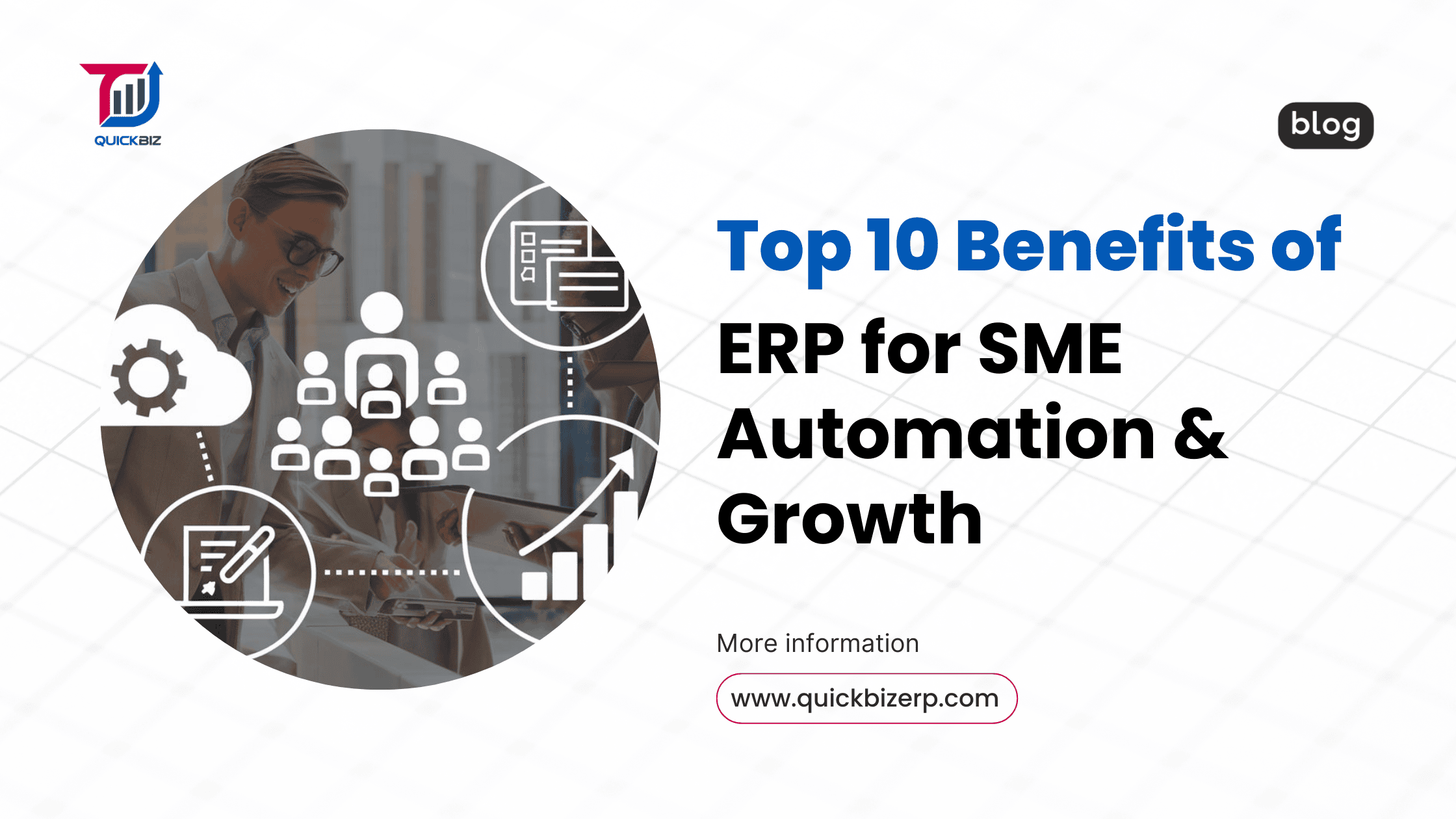Top 10 Benefits of ERP for SME Automation and Growth

Introduction
Small and medium-sized enterprises (SMEs) face numerous challenges when it comes to managing operations efficiently. From handling multiple processes simultaneously to maintaining accuracy in data management, SMEs often find themselves juggling tasks that take up valuable time and resources. In this fast-paced business environment, an effective solution is needed to streamline these operations and support sustainable growth. This is where Enterprise Resource Planning (ERP) systems come in, transforming how SMEs operate by automating core business processes.
ERP systems integrate different business functions into one comprehensive platform, providing significant benefits in terms of efficiency, decision-making, and long-term growth. Let’s explore the top 10 benefits that ERP brings to SMEs, enabling them to automate their operations and scale with ease.
1. Enhanced Efficiency and Productivity
One of the most immediate and noticeable benefits of ERP systems is the increased efficiency and productivity they offer. By streamlining workflows and automating repetitive tasks, ERP reduces the need for manual input, allowing your team to focus on higher-level strategic activities.
For example, tasks like inventory management, payroll processing, and order tracking are automated, which reduces errors and saves time. This automation directly enhances overall productivity by freeing up time for employees to concentrate on critical, value-adding activities like business development and customer relations.
2. Improved Data Accuracy and Real-Time Insights
In business, accurate data is key to making informed decisions. ERP systems centralize all business data into a single platform, ensuring that information is consistent and up-to-date. With integrated data management, businesses gain access to real-time insights that can be leveraged to make timely, data-driven decisions.
For instance, managers can instantly access financial reports, sales data, and operational performance metrics, enabling them to identify issues and opportunities faster than ever before. This agility leads to more accurate forecasting and more informed business strategies.
3. Cost Savings Through Automation
ERP systems can significantly reduce operational costs by automating processes and improving overall business efficiency. Automated workflows mean fewer errors, reduced administrative overhead, and less time spent on manual tasks, which in turn cuts costs associated with labor, delays, and rework.
Case Study: An SME implementing an ERP system for payroll automation saw a 30% reduction in the time spent on administrative tasks, leading to direct cost savings in payroll management and improved employee satisfaction.
4. Better Inventory and Supply Chain Management
ERP systems are equipped with tools that automate inventory tracking and demand forecasting, helping SMEs maintain optimal stock levels. By providing real-time updates on stock quantities and supply chain movements, ERP minimizes the risks of overstocking or stockouts, leading to better inventory management.
Moreover, with automated supply chain management, SMEs can ensure timely deliveries and optimize their supplier relationships, resulting in a smoother operational flow and reduced waste.
5. Scalability for Future Growth
As SMEs expand, the complexity of their operations naturally increases. ERP systems are designed to scale with your business, accommodating new processes, departments, or product lines as needed. Whether your company is growing regionally or internationally, ERP offers flexible solutions to adapt to changing business needs.
Customizable ERP features allow businesses to tailor the system to specific industry requirements, making it easier to scale without worrying about system limitations.
6. Enhanced Customer Relationship Management (CRM)
Customer satisfaction is a major factor in business success, and ERP systems come equipped with integrated CRM tools that can help SMEs deliver exceptional customer service. These tools enable businesses to track customer interactions, personalize services, and respond to inquiries or issues in a timely manner.
By automating communication workflows and maintaining a customer database, SMEs can build stronger relationships with customers, increasing retention rates and encouraging repeat business.
7. Compliance and Risk Management
Regulatory compliance is critical for businesses, and ERP systems help mitigate the risks associated with non-compliance. ERP platforms are equipped with tools that help track and manage regulatory requirements, ensuring that your business adheres to local and global standards.
In addition to compliance, ERP also enhances risk management by providing real-time monitoring of business operations, identifying vulnerabilities, and offering insights into potential risks, enabling businesses to take proactive steps before issues arise.
8. Mobile and Cloud Accessibility
Cloud-based ERP systems offer the flexibility to access business data from anywhere, at any time. With mobile apps and web-based platforms, employees can stay connected and make decisions in real-time, whether they are in the office or on the go.
This accessibility is especially important for businesses with remote teams or those operating in multiple locations, ensuring that key data is always available at their fingertips for improved collaboration and productivity.
9. Improved Team Collaboration
ERP systems break down silos between departments by offering a unified platform for communication and collaboration. With centralized access to important data and shared tools, teams can work together more effectively, reducing miscommunication and improving decision-making across the organization.
Real-life examples show that teams using ERP systems experience smoother workflows, faster project execution, and enhanced teamwork, which ultimately leads to better overall performance.
10. Competitive Advantage
The business landscape is highly competitive, and SMEs need to stay ahead of the curve to thrive. ERP systems provide businesses with the tools to innovate and adapt to changing market demands. With improved data insights, automation, and operational efficiency, SMEs can differentiate themselves in the market.
Moreover, ERP systems enable SMEs to implement continuous improvement initiatives, ensuring long-term sustainability and maintaining a competitive edge.
Conclusion
In conclusion, ERP systems offer a wide range of benefits for SMEs, from streamlining operations and reducing costs to providing data-driven insights and enhancing customer relationships. As automation and data integration continue to transform the business world, SMEs that adopt ERP systems will not only enhance their operational efficiency but also set themselves up for long-term growth and success.
If you're ready to take the next step in automating your business and optimizing your operations, consider exploring ERP solutions tailored for SMEs. With the right ERP system, you can unlock your business's true potential and drive it toward greater efficiency and profitability.

